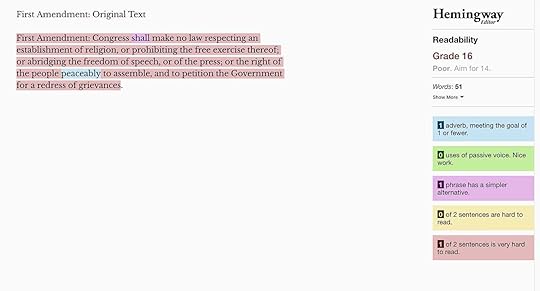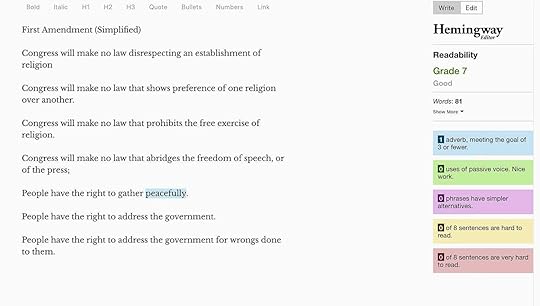A.R. Mitchell's Blog, page 6
October 17, 2024
Specialized Skills for Ancient Business

In the founding eras of civilization, communities came together around agriculture. Once they had a consistent established food source, they had the opportunity to have hobbies and find their skills and talents. These hobbies… such as beadwork, pottery and weapons specialization came into opportunities to trade.
I should add that hunter gatherer societies do have these little trade developing hobbies, but the mobility of their lifestyle leaves less for archaeologists to find and the fragments that are found, archaeologists are only guessing at the context. Rock art is a good example of this… we only have the drawings and experts are guessing at what they mean.
On cultures that leave a lot of material behind there have been numerous moments where scholars have found things and tried to guess what they were for, only to have someone who still works in that ancient field go… “Yeah. This is the modern version.”
For instance ancient sippy cups:

These let mom have a break and get some things done. When archaeologists studied them they found the contents were cows milk, so that suggests a farming community with domesticated cows who were being milked.
Milk is great protein source and cattle could also be used as a food, shelter or clothing source. They helped with farming by breaking up the soil so families could plant more crops. More crops hopefully meant more food, which led to life improvements for everyone.
Business should ultimately be about resource improvement and specialization of skills, so that you can work on what you’re talented in. And with the internet being able to connect us all, I would venture to suggest that we’re back in an era of resource improvement and specialization, where we can all spend a little bit of time working on what we’re talented in. It may not always earn us money - but someone will find it helpful.

Here’s the full article: It does mention graves and human remains. (No images, just mentions.) https://www.livescience.com/ancient-sippy-cups.html
Share Chronic Writer by VintageInkSlinger
Thanks for reading Chronic Writer by VintageInkSlinger! Subscribe for free to receive new posts and support my work.
October 10, 2024
Business

When an unknown civilization is discovered, archaeologists and anthropologists look for five things:
Cities
Emergence of Hierarchical Government
Specialized workers and tradesmen
Religion or spiritual beliefs
Record Keeping
I really want to focus on specialized workers and tradesmen, because trade was an early form of business. Trading helped build civilization’s first cities. Record keeping followed along with formalized laws (government) and religion.
Today I feel like business gets a poor reputation because people confuse trade and commerce for exploitation.
And yes, exploitation can and does happen. But there are plenty wonderful small business owners who care about their employees and make excellent ethically-sourced, good quality products.
Trade brought cultures into contact, and while that did result in some devastating wars, plagues, and brutal exploitation - trade has also been quietly lifting families and communities out of poverty and survival based farming since before we had formalized civilization.
Business helped build civilization. Trade is still bringing people and communities together in small towns, farmers markets, community based skill lectures and teaching opportunities.
More on this next week…
Bonus lesson today for the authors here who write in genres that appear in other realms and have to engage in a process called ‘worldbuilding’. This means that they build an entire world that their characters inhabit and events occur in.
If you want to know more about worldbuilding in the context of being an author here’s one of my older posts: Worldbuilding
Share Chronic Writer by VintageInkSlinger
Thanks for reading Chronic Writer by VintageInkSlinger! Subscribe for free to receive new posts and support my work.
October 3, 2024
Ongoing Learning Opportunities

When I was attempting to figure out what to do with my life after my migraines got out of control, I took a look at going back to school. I went to check out a local college and found it ridiculously expensive. They didn’t take federal aid - but they were all too happy for me to fall into debt.
I chatted with my tour guide. As we spoke about what he was doing, I realized that as an author and researcher, I was already doing what he was describing - without the school debt.
My point is you don’t need a degree. We’ve been sold the story that a college degree makes you a more valuable member of society. However, the truth is that many people are not able to afford the college system, so they make their skills and pathways somewhere else.
I’ve been writing since I was in fifth grade. My writing skill set is growing, because I’m finding opportunities to use it. Are these career makers? Not always, but they are making a difference.
Your ongoing learning opportunities often show up in:
Volunteer efforts - pick a cause you like and find someone local who wants to fix a problem. It’s a great mental health opportunity and a community building exercise.
Seminars/lectures - these are everywhere too, online and in person. Look around for something that interests you. This is a community effort, just like volunteering.
Podcasts - like a radio broadcast or talk show. Pick a topic and you’ll probably find a podcast on it. Most are free. Some shows have extra episodes for fans that are behind a paywall.
Books - can be from online or physical libraries. Most are free.
Video Courses - yes, they’re still a thing, and Youtube can count as long as the person teaching has specialized knowledge or life experience in the topic
Online courses & Apps - numerous options here, all digital, all low or no cost. Duolingo would be a good example.
Open Courses - these are courses from various colleges and universities that are copyright free and can be used anywhere at low or no cost
Scholarships - I’ve found its best to ask even if you don’t see anything on their websites.
Speciality Learning Organizations - I got my ancient history degree from a school like this. It was started by ancient history scholar.
Professional Trade Organizations - I’m working on getting a Traumatic Stress Studies Certificate from a professional organization like this.
Some of these will offer certifications for low or no cost. If the tasks or topics interest you - you will make and take time to learn. You will also know what your learning style is, so you can figure out what resources will suit you best.
I want to leave you with the story of a money manager:
I apologize for not having names or details because I can’t find the article. But I think it was the father of Jaspreet Singh, (https://theminoritymindset.com) or Patrick bet David (https://www.patrickbetdavid.com).
This man’s family was an immigrant family. They escaped 1970s Iran (???) and ended up in New York City. His father drove a taxi cab for decades to feed his family… even though he was an experienced heart surgeon. He taught his son, “The regime took away my health practice. They took away my medical license. They took away our home. They tried to take away our freedom and our lives. But they didn’t take away my education or the skills that I learned. Even though I drive a taxi, I am still a heart surgeon, because no one can take those skills from me. I earned them. They are mine.”
His son is a major money manager who offered his father’s advice in an era where many people are uncertain about what to invest their resources in. He said, “Invest in yourself, your skills and your education. No one can take that from you.”
Share Chronic Writer by VintageInkSlinger
Thanks for reading Chronic Writer by VintageInkSlinger! Subscribe for free to receive new posts and support my work.
September 26, 2024
Learning Styles

Last week I mentioned homeschooling. While its not for everyone its worth noting that homeschooled students have the opportunity to adjust their learning to the learning style that fits them best.
There are different learning styles and methods:
Visual: See or read
Auditory: Hearing
Kinetic: learning by doing.
Schools are set up to benefit those whose learning style is visual (see or read), then auditory (hear). Those who have to do what is being taught before they understand it and those who have to move while being taught are often not considered. It doesn’t mean you’re not intelligent or interested or able to learn… it just means the system was not set up to favor your learning style. There is nothing wrong with you and you just need to find a system that works for you or create one of your own.
Here’s a quick quiz to learn your learning style and how you process information:
https://www.learningstylequiz.com
Public schools don’t have the time and resources to work with individual students and tailor the lessons to those students, except in the cases of extreme learning or behavioral issues. Homeschooling allows this. (There are still standards and grading systems depending on what state or country you’re located in.)
My parents had me take a standardized test yearly. They didn’t have to - they just wanted a way to prove to them that I was learning and wouldn’t be the little weirdo who only knew horses and history. (Don’t worry - I eventually started reading books on organized crime and serial killers. I’m not sure they were thrilled, but there are plenty of days where I use this knowledge.)
By knowing how you process information best, you can improve your understanding and completion of skills. The unfortunate thing about standards, is that they are set to measure skills and some of the most critical skills are not measurable. As we get more reliant on technology - human based skill sets are becoming incredibly valuable in the workplace. https://www.opencolleges.edu.au/blogs/articles/6-skills-that-won-t-be-replaced-by-artificial-intelligence
This is good news, especially for the sensitive, creative, empathic people who have learned to read and judge human behaviors. As trauma survivors and healers we can all benefit and use these skills. The people based skills cannot be truly replaced by machines or technology - because human connection is not a measurable trait.
Schools also cannot teach these skills, especially with their current programs because they’re not looking out for the individual student. They just don’t have the resources. Homeschooling, tailored to the individual student or in small groups with a focus on education and life skills - helps kids not only learn important social skills in a more organic environment - socializing with people of all ages, instead of just their peers - but it surrounds them with opportunities to bring their talents and interests into the educational curriculum, often filling in needs that the public schools had to cut due to budgets. Art, music and dance flourish in homeschool circles… so do the trade skills like small engine repair and agriculture. (We all drive or use a vehicle to get places and we all eat.)
There is also a hybrid form of this. My younger cousins were in public high school and middle school during the 2020 lockdowns. They needed the structure of a school day and sitting in front of the computer with the distractions of home wasn’t helping them. Other parents in the community noticed this too. So they gathered at a local non-profit, following all the safety protocols and had a ‘school’ set up there. Each student had their computer and their own lecture, but everyone had the structure of a shared space. There were adults to monitor the situation and help out if something happened, while other parents got to concentrate on their work. Without the distractions the kids were able to finish their school work because their brains recognized the routine of school vs goof off time at home, and that helped them concentrate and graduate.
Next week we’ll talk about continuing education.
Share Chronic Writer by VintageInkSlinger
Thanks for reading Chronic Writer by VintageInkSlinger! Subscribe for free to receive new posts and support my work.
September 19, 2024
Modern Education

Last week we looked at education standards from the 1770s at the founding of the United States of America, and compared our education standards from that era to our present era.
There was a marked difference…
And I asked you to speculate what happened. Here’s my take on things:
There are couple of different reasons why our education levels are so different from those in early America. As the country grew the need for education rose. The government ended up being involved. And then standards were applied. Unfortunately these standards which were supposed to help gauge success - were recently tied to funding.
In order for the schools to get funding, teachers ended up teaching the test, instead of life or academic skills. This became and continues to be a massive mess. Every few years there’s another dismal report about lower and lower scores.
We also have turned schools into holding centers for students while their parents work. I’m not saying ‘don’t send your kids to school’ or ‘you’re a bad parent if you can’t sustain a family on a single income.’ That’s a terrible story to tell yourself and your kids.
Unfortunately, what we do as a society, far too early in life, is expect kids to sit still and learn. These environments aren’t built for kids natural learning abilities.
Kids should be curious, they should be active. Their bodies are learning along with their minds. If a kid is waaaaaaay too still - it might be a freeze response, or an overwhelm response. (Think of the startled rabbit freeze, or deer in the headlights expression.) They can’t learn if they’re afraid or overwhelmed. The brains of grownups don’t work like that - it’s unfair to expect a kid to respond like that and be educated. Kids just don’t have the capacity. It’s not that they’re not intelligent - it’s that their brains are focused on other things.
Classroom sizes have gotten larger. This leaves a larger dis-regulated group of kids in front of one equally overwhelmed teacher. It takes skill to control kids. I’m not sure anyone can control a group of kids 100 percent without resorting to some unhealthy disciplinary actions. So many teachers turn to the medical system, putting naturally busy kids on ADHD drugs. (For more information about ADHD - Attention Deficit Hyperactivity Disorder https://www.additudemag.com/adhd-symptoms-checklist/)
The interesting thing is that the ADHD drugs don’t work on kids who are dealing with dis-regulation due to trauma. That’s because trauma is literal brain damage. The brain’s learning capabilities aren’t a priority when your body is caught in a hyper vigilance trauma fear or flight loop. This is true for adults and kids.
(It’s an ongoing conversation in mental health circles how to help kids with trauma who are misdiagnosed with ADHD and similar issues, especially in refugee populations. Added to this challenge is that the kids and caregivers are often not native English speakers.)
Some parents know this. They realize that the school they’re sending their children to may or may not be good for them. Sometimes they take action by switching schools. Sometimes they can’t. The lockdowns of 2020 made many parents realize that their kids weren’t getting a quality education and the parents took action. Many decided since they were home and the kids were at home - that homeschooling or cyber schooling would result in a better education.
I grew up among homeschoolers and was homeschooled for a time myself. It has its ups and downs, challenges, victories and pitfalls. But as I’ve watched the school system get larger and often less likely to cater to its student’s individual needs - its worth saying that homeschooling is a doable alternative.
Share Chronic Writer by VintageInkSlinger
Thanks for reading Chronic Writer by VintageInkSlinger! Subscribe for free to receive new posts and support my work.
September 12, 2024
Education

The investment in education starts when our children are young. Public education and skills for all was part of the vision of the colonists in early United States history. It was important for the children to not only know their history, but how to pass it on to the next generations - through reading, writing and mathematical skills. These skills helped build the early nation… as well as the non-traditional skills, like survival skills, tradesman skills, and empathy and anthropology skills.
I add empathy and anthropology skills because early mountain men and traders learned the culture of the indigenous tribes and often traded with them and spoke their language. These mountain men traders and explorers knew their survival depended on cooperation and understanding from the tribes that they encountered.
It wasn’t always friendly - but the explorers learned from those who were there before them. And that’s a type of education that can’t be found in books.
Later, it was often women who went west to teach children how to read and write. These children of the pioneers were often schooled in multiple languages, including Hebrew, Latin and Greek. They could read and write, and much of it was based on memorization. The children of all grades were taught in one area - a schoolhouse or a church, and these children helped each other learn, with the older ones teaching the younger ones.
Education was vital. It was a mark of civilization. To be educated often marked you for success. The foundation documents - both religious and governmental were written at the level so that a farm boy could understand his rights. This meant that the Bill of Rights and other founding documents were written on a level so that everyone could understand them.
Here’s an example:
First Amendment: Congress shall make no law respecting an establishment of religion, or prohibiting the free exercise thereof; or abridging the freedom of speech, or of the press; or the right of the people peaceably to assemble, and to petition the Government for a redress of grievances.
Source: https://constitution.congress.gov/constitution/amendment-1/
That’s a seriously complex sentence. It’s accurate, as in it’s a direct quote of a historical document. It says what it needs to say, while leaving room for extra laws to be made around it to regulate things further as technology and situations develop. It says what Congress (an elected, law making governmental body is not allowed to do). It also details what the people are allowed to do, especially if there’s a disagreement.
Here’s how the US government website breaks down the First Amendment:
The First Amendment to the U.S. Constitution,1 viewed broadly, protects religious liberty and rights related to freedom of speech. Specifically, the Religion Clauses prevent the government from adopting laws “respecting an establishment of religion”—the Establishment Clause—or “prohibiting the free exercise thereof”—the Free Exercise Clause. The First Amendment also expressly protects the freedoms of speech, press, peaceable assembly, and petition to the Government.
Source: https://constitution.congress.gov/browse/essay/amdt1-1/ALDE_00000210/
Not brilliantly clear, but it gets rid of some of the archaic language and older sentence structure that makes things difficult to read.
I used the free version of the Hemingway app to give you a look at how I would simplify this for teaching.
(If you click on the link, it should come up with what I put in. I’ve also got screen shots of the finals.)

The main point I want to draw out of this is that the original text scored a grade 16. Grade 16 would be college level reading.
And even after I simplified things it was still scoring at seventh grade reading level.

Our modern sources of news are written at a first-grade to third-grade level.
What happened to our education?
Stay tuned!
And feel free to speculate in the comments!
PS: I’m not a Constitutional lawyer. I did take some law and civics courses for my criminal justice degree, but that doesn’t officially qualify me to translate the Constitution for legal level situations.
Share Chronic Writer by VintageInkSlinger
Thanks for reading Chronic Writer by VintageInkSlinger! Subscribe for free to receive new posts and support my work.
September 5, 2024
News Media

One last post on arts, media and entertainment….
I covered the art of storytelling and how it filters into entertainment, the last several weeks. Today I’m going to spend a little bit of time on news media.
This is media that specifically non-fiction and usually filtered around current events. It can also be extremely disheartening. But you have to understand that these media stories are focusing on a narrow spectrum of current events. The news media are picking the current events and choosing to cover the stories that they can profit from.
I don’t mean this is in a sinister way - someone has to pay the bills. And the way news media works is that they have to sell a story that will get eyes on the news station and the advertising. My mother worked in advertising - it was how she used her creativity to pay the bills. But she was extremely aware that most holidays were focused on buying and selling - not their original intent. She passed this knowledge onto me - so trust me when I tell you there is always another sale coming.
Once you realize that the news is a product - you can start to spot trends. I’ve been doing this on my Yahoo news page for the past two years.
Oh… there’s a famous person who we haven’t heard from in awhile.
Oh. They’ve got a movie coming out soon.
Ok. Why are you pushing this movie?
Ok. What’s the movie about?
Ok. What is it you’re trying to push on me with that story?
All the things that you see in the news and usually on your email homepage (Yahoo, Aol, whatever the @ symbol is behind your email address), are all trying to take your attention and guide it to a particular story. This story could be fictional, it could be real events.
My criminal justice professor spoke of something called the ‘media effect’. The media effect would be to report on a story and spread fear and panic by giving just enough of the story to make people afraid. One of the media effect’s tactics is to repeat the story so it looks like its everywhere all the time.
I’ve seen this with the Weather Channel. When I worked third shift there were nights when I was tired so I needed to have noise and movement flickering at the corner of my eye so that my brain’s biological survival system would be alerted and I would stay awake. There were many nights when big storms rolled through somewhere in the United States and were reported on every fifteen minutes.
As a historical researcher, I’m familiar with emergency broadcast systems and historical broadcasts. These historical radio personalities were practiced individuals who knew the horrendous static content of their broadcasts - so they had to learn to speak clearly and calmly.
Our modern newscasters and reporters have better technology so that struggle is mostly eliminated - but their reports and their voices would amp fear and excitement. This is on purpose.
One of the fear responses is to freeze. If you freeze while watching their program because you’re afraid of whatever events they’re showing you, they get your attention longer and that means more money in their pockets.
So if you find yourself panicking after watching the news, or looking at your internet feeds - that’s the intent. Its not to inform - its to overwhelm and cause poor decision making. The news is a product. It gets bought and sold like everything else.
We need the information in some cases, but choose carefully what you consume and how much time you spend thinking about it. Its not healthy to focus on events that frighten us.
Thank you for reading Chronic Writer by VintageInkSlinger. This post is public so feel free to share it.
Thanks for reading Chronic Writer by VintageInkSlinger! Subscribe for free to receive new posts and support my work.
August 29, 2024
Reintroducing Creativity & Storytelling

So I’ve talked about how entertainment is filtered through a series of changes and agendas that industry gatekeepers enforce in the narrow world of big name movies and big name budgets. I called it the knowledge filter.
I want to discuss the solution this week… reintroducing creativity and storytelling.
I grew up before the accessibility of all kinds of film and digital media technology. And artificial intelligence is poised to revolutionize what was already overturned by the fact that Smartphones have turned everyone into a potential movie director. But the vast majority of cell phone cameras and content have been focused not so much on story - but on personal attention. As in, a teenager telling the world about their life for likes and follows.
This isn’t storytelling in the traditional sense… and it probably won’t ever fill the need for an actual movie or form of entertainment. But an entire generation has grown up on this as their form of entertainment and even news. And that’s a little scary - because they don’t have a storytelling format in their mind. Its impacting their ability to concentrate and complete tasks. Some have been able to hack their attention spans and can focus on about three different things at once. But the brain research on that shows that for every multitask you add, your ability to work and concentrate on things as a whole, decreases.
The solution is re-introducing storytelling.
Its not a method that schools teach because - I’m going to sound conspiratorial for a moment - but creativity once unleashed is not something that is a controllable force. What I mean by this is that creativity is not an exploitable measurable enterprise that can be manipulated into a consistent result. You can’t measure it. You can’t control it. You can’t say its successful by a common test. You can’t solve it like a math problem.
Schools are supposed to teach life skills. The result is that they focus on what is measurable. And those measuring standards have continued to drop, because passing scores are tied to funding.
People who think outside the box can be perceived as threats. They don’t always do well in schools. Yet societies desperately need creativity to survive. Inventions come from creativity. Problem solving for social issues comes from creativity. To look at the world in a slightly different methodology is to open the eyes of someone around you.
I was chatting with a volunteer group leader and I said, “Well… the way I plan is to say, ‘what’s the least amount of product I can put out to appear to be the most efficient?’ And then I answered it. ‘Once a month. So we have one episode a month. That means we only need twelve episodes.’”
He’s a successful small business owner. He suddenly blurts in the middle of my planning explanation, “That’s genius!”
I made his goal doable by introducing a planning system that was achievable, due to the fact that I asked a question from a different angle. This is creativity.
When we reintroduce storytelling, or teach our kids and ourselves different stories - that trains the brain. And kids naturally have imaginations… imagination is like any other muscle, the more you use it, the better you get.
You’ve also seen as we’ve gone through this series and my other blog posts, how vital storytelling is for healing. Its a skill we all need and its a skill that can change the world.
It doesn’t rely on big budgets, or gaining attention, it relies on you, and you alone, changing yourself and eventually those around you with a story. And that goes back to our earliest ancestors sitting around a campfire - creating the cultures that would become civilization.
Thank you for reading Chronic Writer by VintageInkSlinger. This post is public so feel free to share it.
Thanks for reading Chronic Writer by VintageInkSlinger! Subscribe for free to receive new posts and support my work.
August 22, 2024
Storytelling vs Propaganda

Last week we talked about the Hays Code and how it controlled story outcome by reflecting the conservative Catholic morals of 1930s USA. The modern movie grading system, does not control story outcome - but a select group of people do.
This select group is usually the people in charge of the either the movie studio, or production company. In the case of books - a publishing company.
There are plenty of books, scripts, movie makers and potential technology for films to be made, but only a select few ever make it to the final stage. This select few are filtered through a system. And its nothing sinister - its based on what the select few will think will sell to the biggest audience, and who these characters will be played by, or what kind of attention can be raised.
Here’s a video on the process:
(How Hollywood Selects Scripts by the Flipside)
To give an example to make this clear…
I’m a writer. I have to come up with content. The content can be anything, but it has to be present in a form of basic idea. (I wanted to say in a form that makes sense - but I’ve seen too many movies where nothing made sense, so that rule is quality issue for me, not always big budget productions.)
So, I take my basic idea and arrange the moving pieces and people into a series of events that have a beginning, middle and end. That’s a story. Then I edit it. Then I publish it.
The old method before self publishing was to go get an agent, who is someone who you pay them because they knew people. The agent would go to various big names with your story, and try to get the big names to buy it.
Once the big names bought your story - it could be handed off to someone who might trash 90% of it. And then it might sit on the shelf for a couple of decades. And someone else might trash another 90% of it. And finally after 30-60 years… someone might dig out the story, and go… oh… This would be a good movie. Let’s change a few more details. And those changes would happen as the team would be looking for locations to film in, people to play the characters, and places that were willing to show the movie once its complete.
The whole process from those final script changes, finding the right actors, filming, editing and then to gathering people in the theaters - that would take a couple more years.
By this point, the original author wouldn’t recognize their script - if they were even alive to see it in a theater.
To give you an idea… There was a Gunsmoke western script called The Pig Farmer. Marshal Matt Dillon is injured and hides out on you guessed it… a pig farm. And there’s a kid involved who he has to protect.
This script sat for several decades and became… Witness. A crime thriller romance about a cop who has to protect a little Amish boy who witnesses a murder. The cop also falls in love with the little boy’s mom, and we see the massive culture clash between the peaceful Amish and a police officer who can’t stand bullies.
Script 2 looks nothing like the original script. And these were all changes to the story which created a successful film. But they were made a select group of people who may or may not have shared the same creative vision or worldview.
Moving this from story content to agenda based content - Hollywood has embraced diversity of roles and are bringing agendas to the table. These agendas are not part of the story, but are often forced into the entertainment in expense of the story. And people are starting to catch on… because instinctively, we all know when a story doesn’t work. When a story doesn’t make sense, or we’re not relating to the characters, we lose interest in the story. This is how humans work with stories. Stories are a form of empathy and engagement. And they’re brain training.
And the people who have the big budgets know this. In fact, they’re getting angry at the original fan bases who popularized the movies - and saying the fans are awful hateful people. The fans are coming back with rants, reviews, and online fan pieces which showcase better storytelling than the big budgets.
This is a form of gaslighting. The big budget gatekeepers who own the entertainment pieces are not listening to the fans. The big budget gatekeepers are actually turning on the fans and slandering them.
What do the fans want? Good storytelling. Authentic characters.
There is a way to solve this. Its by listening and then delivering the content the fans want. Some franchises have been successful at this and its grown the franchise. (Star Trek is one of the few.) Most have not. And that’s because the big budget gatekeepers were interested in their agendas, and sacrificed the story to tell that agenda.
To be clear - I’m not against diversity of roles - I’m a writer. If my character is a black female, I’m going to treat her with the same respect as if my character was a white male. I choose my characters for my story needs - not to cater to an agenda. I believe most audiences do the same thing.
What I have issue with is a knowledge filter - where a select few decides to force their ideas onto everyone else. That’s not storytelling - that’s propaganda.
Thank you for reading Chronic Writer by VintageInkSlinger. This post is public so feel free to share it.
Thanks for reading Chronic Writer by VintageInkSlinger! Subscribe for free to receive new posts and support my work.
August 8, 2024
Storytelling Content Regulation

In effect, movies and tv/streaming shows are no longer storytelling… its a game of influence and agendas… aka propaganda.
How did we get here?
Storytelling has almost always in history been stolen for propaganda purposes - but that influence has increased with the rise of movies. At first films were expensive to make because of the resources involved. You had to get film, get content to put on film - and that meant building the locations and finding people, objects and animals to fill those scenes. You also had to have a storyline, so it wasn’t just random moving pictures.
The first films had little to no content regulation. I was watching an older German film from the 1920s or 1930s. It was kind of a shock because the camera angles and content were so different from any film from that era in the United States. I even spotted a drug deal on one of the street scenes.
To give an example… in the above film, (which I would reference if I remembered the name,) a poor girl invites a man she just met back to her apartment - which is one room with a mattress on the floor. She comes in, sits down on the mattress, and most of her leg is shown. Not in a seductive way - but in a way that shows leg above the knee, which you wouldn’t see in an American film of that era. And then the guy sits down with her, beside her, on the mattress. The two characters chat. There’s nothing explicit - she just confesses that she’s in a desperate place, and he offers to take care of her. Its a romance - he keeps his word and after some challenges all is reasonably happily ever after.
Contrast this with the scene in the classic film ‘Its a Wonderful Life,’ where George Bailey (played by Jimmy Stewart) finds out that his wife is pregnant.
Notice: He sits on the bed. They’re both clothed. She doesn’t say that she’s pregnant. They kiss, but there’s nothing explicit.
Think about how different that scene would be today.
The difference is something called the Hays Code.
The Hays Code was a set of rules based on Catholic morals. (This was the 1930s, so these morals reflected a significant portion of Americans.) Many modern commentators will claim this as censorship and how it kept minority populations from gaining voices. But what I want to pull from this is that it gave content parameters, and allowed writers to attempt to figure out how to write stories that discussed important issues within these boundaries. (Here’s some info: https://www.studiobinder.com/blog/what-is-the-hays-code-1934/, https://en.wikipedia.org/wiki/Hays_Code)
There was an independent art film scene that didn’t follow these rules and there were plenty of other countries that didn’t have these restrictions.
The Hays Code was replaced with the rating system we have today. G, PG, PG-13, R, NC-17. This delivers no content parameters, but grades content.
In many cases, movie producers know that people will ignore a G or PG rated film, so the producers actively aim to get a PG-13 rating. And the intensity of what constitutes PG-13 has increased over the years since PG-13 was added in the 1980s.
For reference, most of my works would probably fall into PG or PG-13, because I write action adventure, and for me a G rated movie means innocent level conflict, like on the level of a classic children’s book… something like the Charlie Brown and Snoopy Peanuts comics.
There is no official content rating system for books other than reading difficulty.
With the Hay’s Code, morals were inserted as content guidelines so that only certain stories would be told. These stories would be passed to the general public… much like religious legends helping people make good decisions that benefit society, instead of creating crime and chaos.
The content grading system - while helpful, does not control the story outcome. The story outcome is controlled by a select group of people. More on that next week.
Thank you for reading Chronic Writer by VintageInkSlinger. This post is public so feel free to share it.
Thanks for reading Chronic Writer by VintageInkSlinger! Subscribe for free to receive new posts and support my work.



